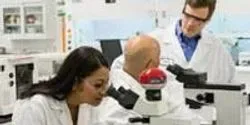News

The custom technologies arm of Molecular Devices, a leader in bioanalytical systems for drug discovery, life science research, and bioassay development, has partnered with the Discovery Technologies team at the Roche Innovation Center Basel of Pharma Research and Early Development (pRED) to develop a high-throughput detection system for drug discovery screens employing Roche’s proprietary Ruthenium-based nanosecond time resolved fluorescence (Nano-TRF®) assays. The pRED screening teams in Basel and Shanghai are now installing the custom-developed Nano-TRF® cartridge in their existing Molecular Devices SpectraMax® Paradigm® multimode microplate readers and will receive on-demand delivery of new cartridges and continuing global technical support.

These two infrared images of C/2013 (Comet Siding Spring) were taken by the Compact Reconnaissance Imaging Spectrometer for Mars (CRISM) aboard NASA’s Mars Reconnaissance Orbiter (MRO) on Oct. 19, 2014. Comet Siding Spring — an Oort Cloud comet that may contain material from the formation of the solar system some 4.6 billion years ago — was making its first voyage through the inner solar system. CRISM and many other instruments and spacecraft combined to provide an unprecedented data set for an Oort Cloud comet.

The joint effort will accelerate the implementation of clinical trials and delivery of stem cell therapies.

South Dakota State University food science professor Padmanaban Krishnan received a four-year grant geared toward getting corn co-products to the food market.

While studying the atmosphere on Saturn’s moon Titan, scientists discovered intriguing zones of organic molecules unexpectedly shifted away from its north and south poles. These misaligned features seem to defy conventional thinking about Titan’s windy atmosphere, which should quickly smear out such off-axis concentrations.
















